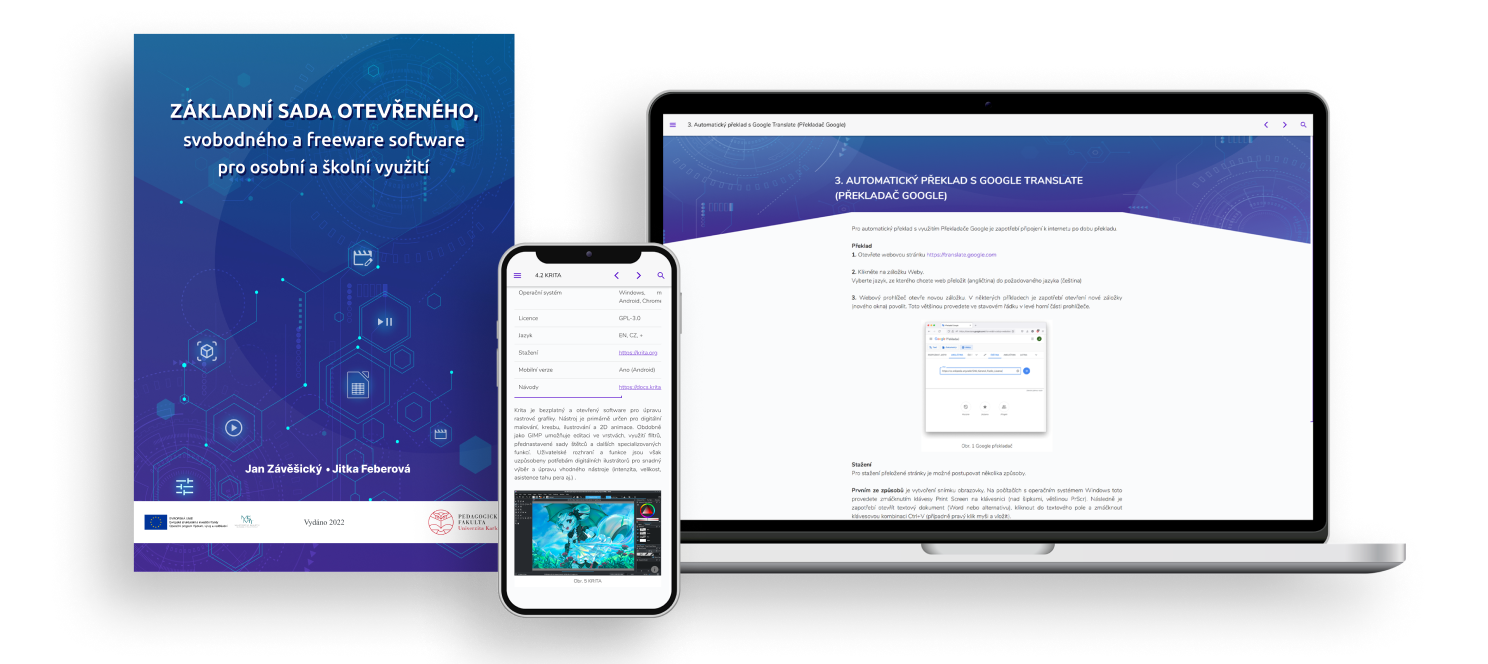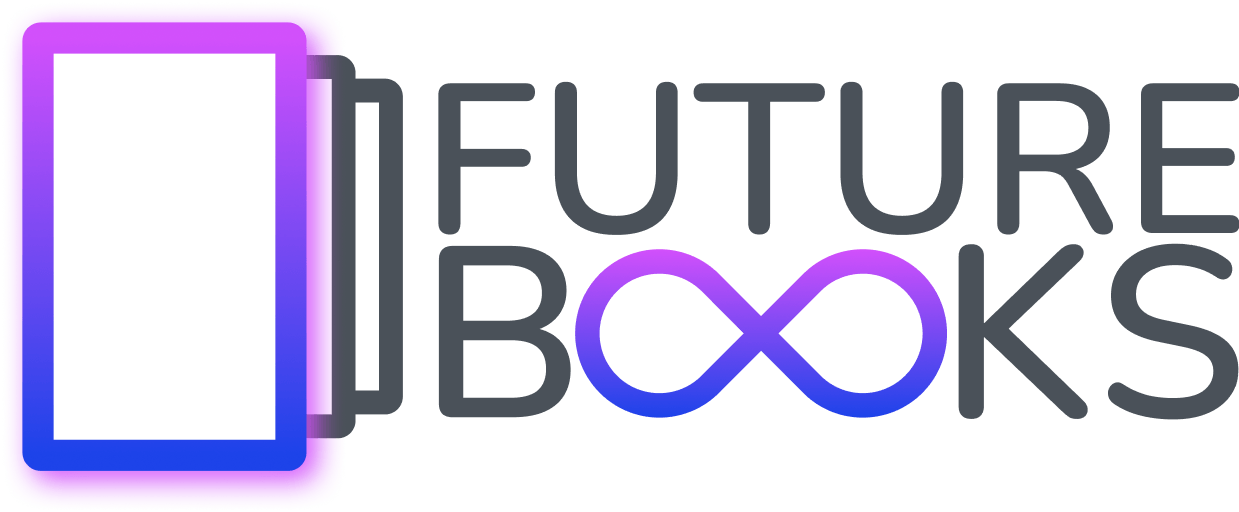New series of books for secondary school teachers published
The COVID-19 pandemic has significantly affected the organization of education at all levels of school systems. Schools were suddenly faced with tasks that were almost unimaginable until then, and there were usually no schemes for solving them that could be fully grasped.
The key phenomenon has become distance education in so-called online or offline e-learning. Even before the pandemic, schools already had various experiences with the use of digital technologies both to support teaching and to support the organization of school and extracurricular activities, but the total closure of schools and the transition to fully distance education was a completely new phenomenon that schools faced with varying degrees of success.
For that reason, the request of educational institutions of the capital of the City of Prague to its founder, to prepare and provide its schools with methodological materials that would help them with a better organization of electronic education.
Kraj hl. The city of Prague, in cooperation with the Charles University Faculty of Pedagogy, therefore, as part of the ESF project "Implementation of the Regional Action Plan 2 - Innovation in Education" implemented in the period 2021 to 2023, also focused on the full-fledged development of distance and hybrid forms of education, where the University of PedF has prepared a number of methodologies but also teaching materials for secondary school teachers and pupils, which can also be used in primary schools. Specifically, these are the publications presented below, to which additional titles will be added in the course of 2023.
Flexible forms of education at secondary school
PhDr. Lucie Rohlíková, Ph.D.
The publication presents various types of flexible forms of education that can expand the portfolio of secondary school offerings. These are forms of education characterized by the geographical separation of educators and students, the use of the Internet and various digital technologies for the implementation of educational activities, and education in systems that adapt to students. It also includes self-education, education focused on the needs of the individual, assisted and social learning, a combination of face-to-face and online education, and open access to education and education outside the educational institution. The publication provides comprehensive insight into the issue and inspiring examples suitable for the context of secondary schools.

Hybrid teaching in the context of secondary school
PhDr. Lucie Rohlíková, Ph.D.
The aim of the publication is to discuss the concept of hybrid teaching in the context of secondary school. It contains the definition of the concept of hybrid teaching and the introduction of various models of its implementation. Attention is paid to the advantages and disadvantages of hybrid teaching and the tools used. The publication also describes specific inspiring examples of the implementation of hybrid teaching in secondary schools.
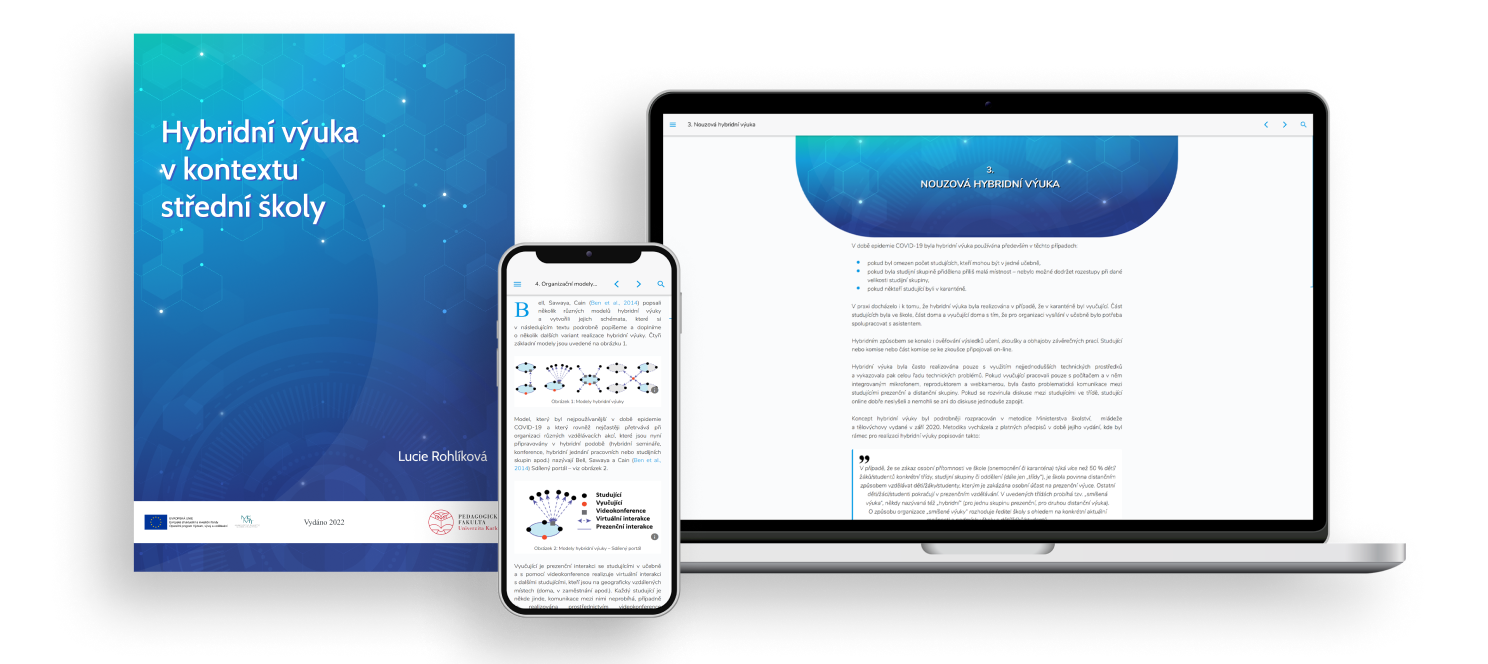
Supporting the mental well-being of secondary school students in the age of digitization - Theoretical foundations
PhDr. Jana Kočí, Ph.D
B.Sc. Dana Koptíková
The interactive learning material Supporting the mental well-being of school-aged children in the age of digitization – theoretical starting points is intended for all participants in school life. The materials can be helpful especially to classroom teachers and teachers who in any way encounter the issue of the psychological well-being of their students, especially in the form of distance learning. The target group is all students of distance education in Czech secondary schools. With up-to-date content and a simple form, the interactive teaching material offers educators an introduction to the issue of the mental well-being of children and adolescents in distance education, and the knowledge that contemporary science offers on the topic of the mental health of students. The material responds to the health challenges of the post-covid era and the transition to a new era of education. In the material you will find available requirements for the development of the well-being of Czech children and children of the European region in the distance form of education, the European framework for building the well-being of school-aged children and the national framework and recommendations for building the well-being of your pupils. The materials also refer to a list of materials available not only here, but also abroad, which you can use in the creation and implementation of strategies for building and supporting well-being in the everyday life of your school.
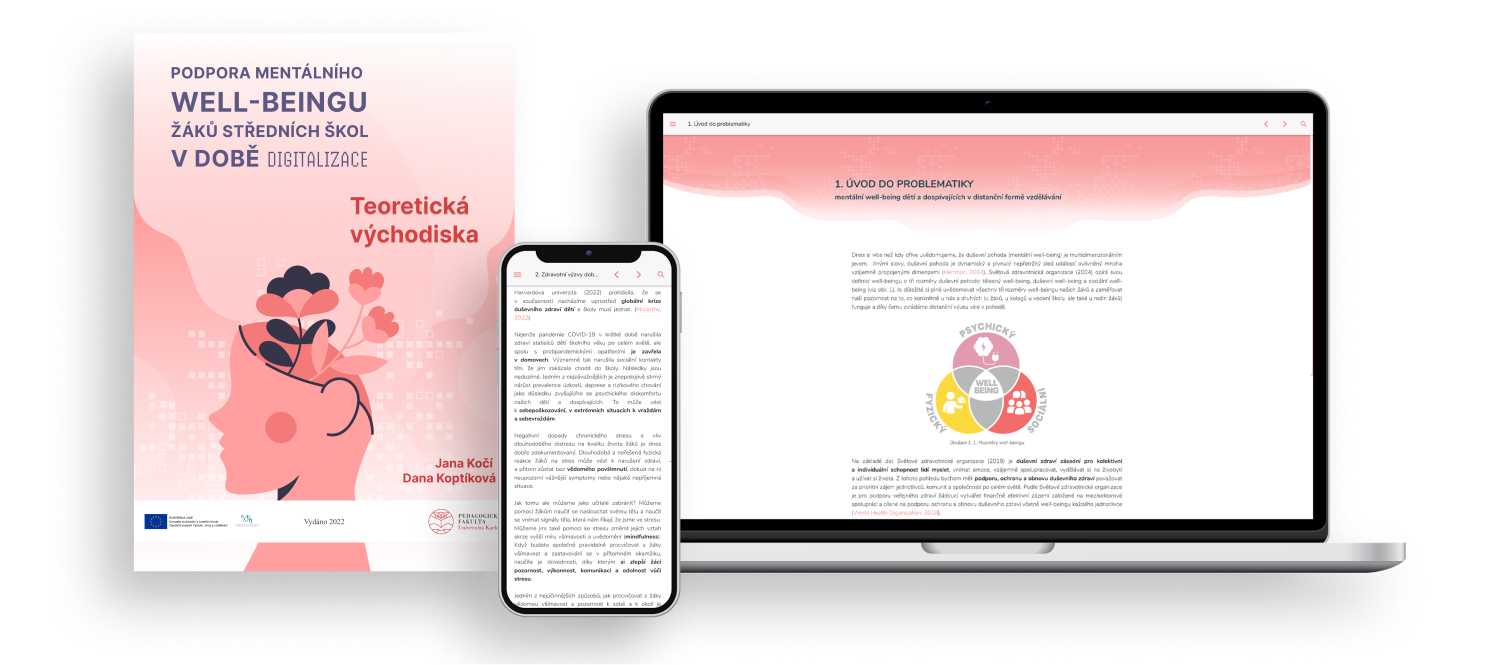
Building the mental well-being of secondary school students in the era of digitization - How to apply practical recommendations in practice
PhDr. Jana Kočí, Ph.D
B.Sc. Dana Koptíková
The interactive teaching material Building the mental well-being of school-age children in the era of digitization - how to apply practical recommendations is intended for all participants in school life, especially for classroom teachers and teachers who in any way encounter the issue of the psychological well-being of their pupils, especially in the form of distance learning. With up-to-date content and a simple form, the interactive teaching material offers teachers the basic information that contemporary science offers on the issue of pupils' mental health. The materials present existing informational, practical resources and examples of good practice focused on effective ways of building well-being in Czech schools in distance education. Here you will also find methodologies and projects for supporting well-being in secondary schools, theories for supporting well-being in secondary schools and evidence-based activities for building pupils' well-being verified by current research. The mentioned chapter presents inspiration on how to incorporate simple but very effective activities that support the building and consolidation of pupils' well-being into the everyday life of the school. As a result of improving psychological well-being, the presented materials also have the potential to help students increase their school success, fulfill their personal potential, and for educators, the presented material can be an aid in the implementation of interventions aimed at building psychological discomfort in their students. Practical use can be found in ten building the well-being of pupils and teachers in secondary schools during distance learning, or the well-being of pupils as a determinant of the well-being of teachers. At the end of the methodological materials, you will find ideas for solving the problems that bothered us during distance learning.
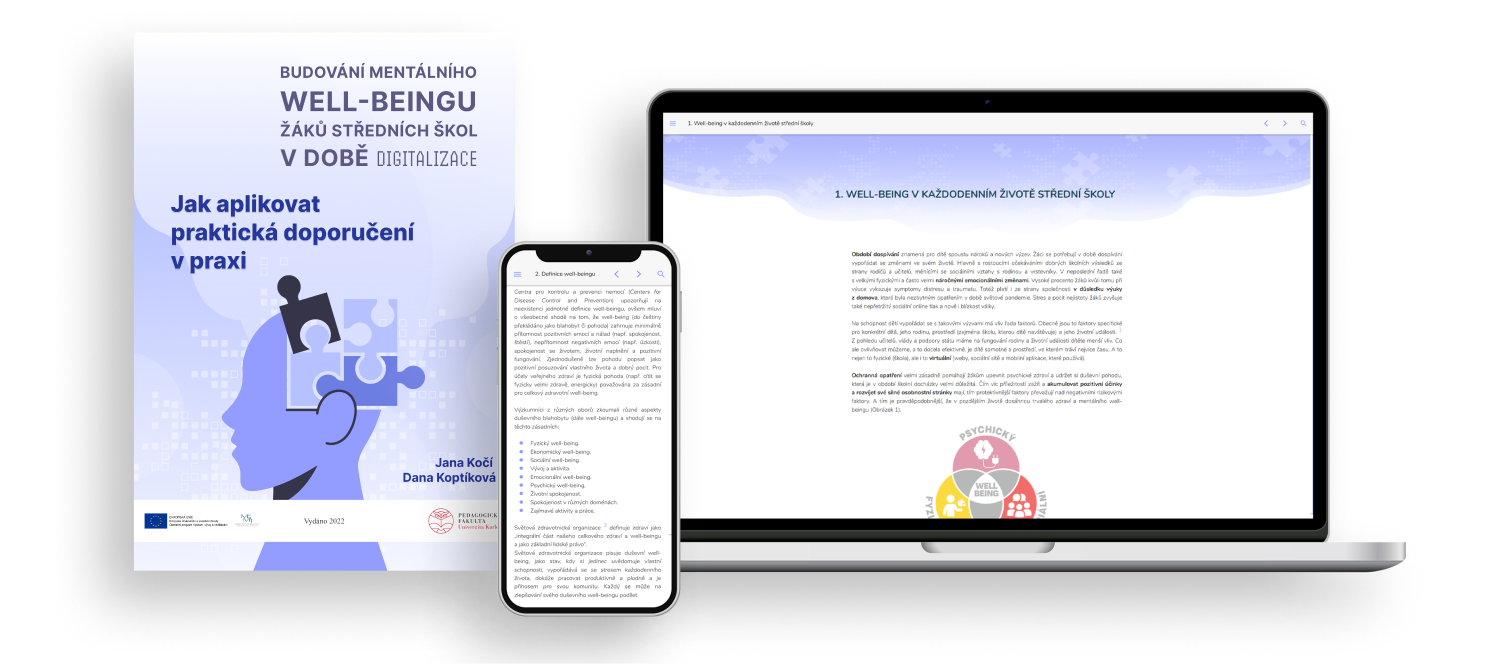
Helper for secondary school principals part 1
PaedDr. Josef Rydlo
Ing. Ondřej Rydlo
The presented distance learning material aims to help principals and other managers, especially of secondary schools, to navigate the tangle of legal norms. The assistant is also useful for potential directors (pedagogical staff - applicants for the given position) and for novice directors. "School" legal regulations (practical designation) are laws, decrees and regulations under the responsibility (jurisdiction) of the Ministry of Education, Youth and Sports. The Help mainly includes the 2 most important school laws: Act No. 561/2004 Coll. (Education Act) and Act No. 563/2004 Coll. (Law on Pedagogical Workers) and their implementing decrees. Legal regulations are constantly changing over time. During the school/calendar year, school principals must monitor various changes in legislation (especially in connection with their amendments). The helper should facilitate their orientation in the given area through selected interactive sources of information. Throughout the material, the principle "briefly, clearly and clearly" is applied. The emphasis is on information that is essential for the basic areas of activity of secondary school principals in the territory of the Capital City of Prague.
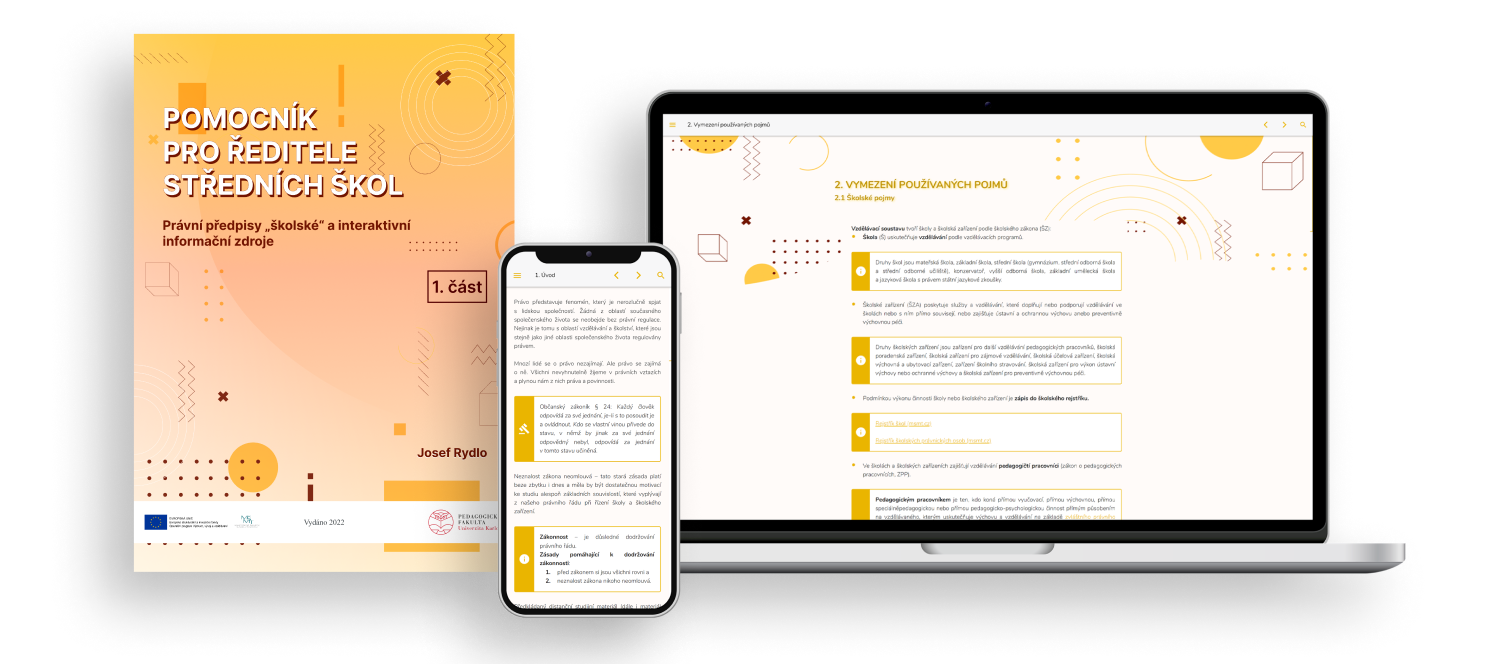
Helper for secondary school principals, part 2
PaedDr. Josef Rydlo
Ing. Ondřej Rydlo
The presented distance learning material aims to help principals and other managers, especially of secondary schools, to navigate the tangle of legal norms. The assistant is also useful for potential directors (pedagogical staff - applicants for the given position) and for beginning directors. "Extracurricular" legal regulations (practical designation) are laws, decrees and regulations under the responsibility (competence) of ministries other than the Ministry of Education and Culture. The Help mainly includes the most important legal regulations that have continuity and connection with "school" legal regulations. Legal regulations are constantly changing over time. During the school/calendar year, school principals must monitor various changes in legislation (especially in connection with their amendments). The helper should facilitate their orientation in the given area through selected interactive sources of information. Throughout the material, the principle "briefly, clearly and clearly" is applied. The emphasis is on information that is essential for the basic areas of activity of secondary school principals in the territory of the Capital City of Prague. The biggest problems with the implementation of legal regulations in pedagogical practice are related to certain areas, specifically the continuity and connection of "school and non-school" legal regulations.
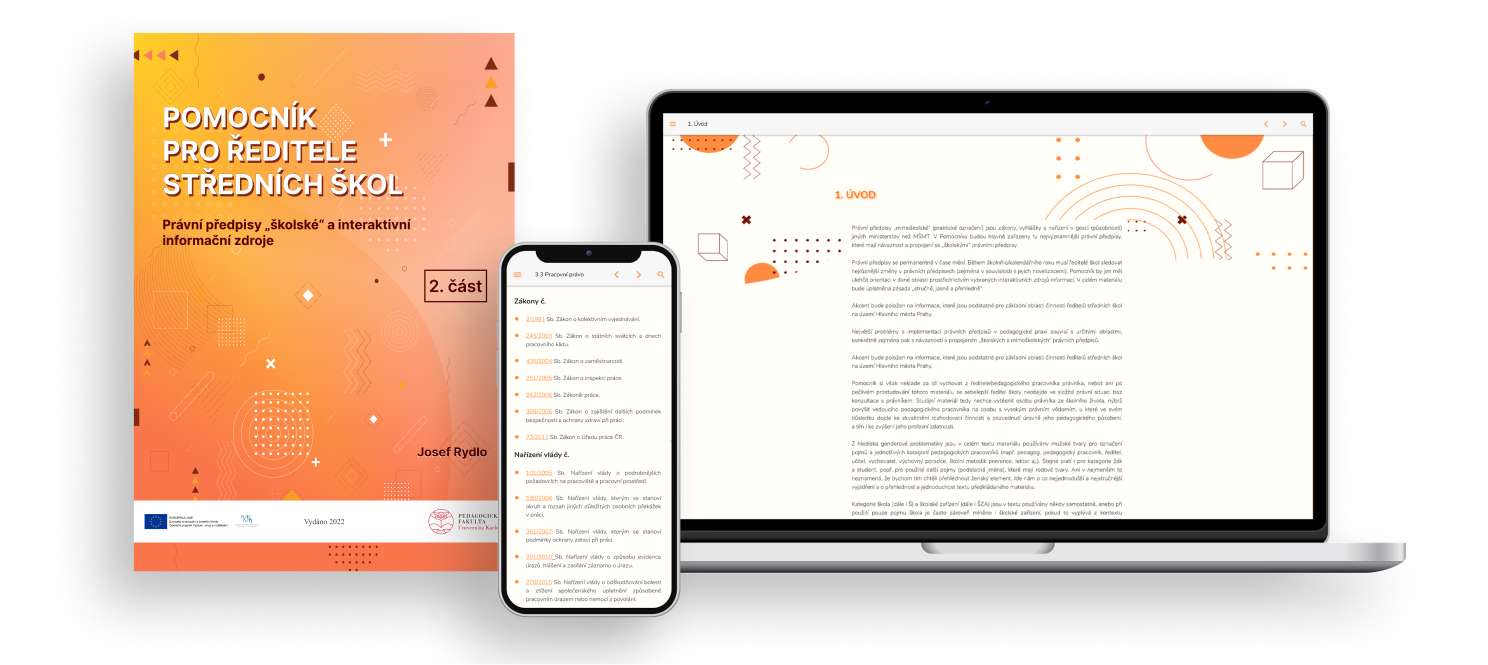
Basics of creating a course in Moodle 4.0 – a practical guide
MDr. Jitka Feberová, Ph.D.
The publication, which has the character of a practical manual, introduces the reader to the basics of working in the LMS (Learning Management System) of the Moodle (Modular Object-Oriented Dynamic Learning Environment) system in version 4.0. Moodle is a system that allows you to manage user logins, create study materials in various tools, enter, collect and evaluate assignments, create and run tests or use communication tools. The advantage of the system is that it is a so-called Open Source system, so there is no need to pay a license for system users. Another indisputable advantage is that the created teaching units can be simply "packaged", either in whole or in part, and "unpacked" in the same or another system installation, so the materials can be shared between institutions.
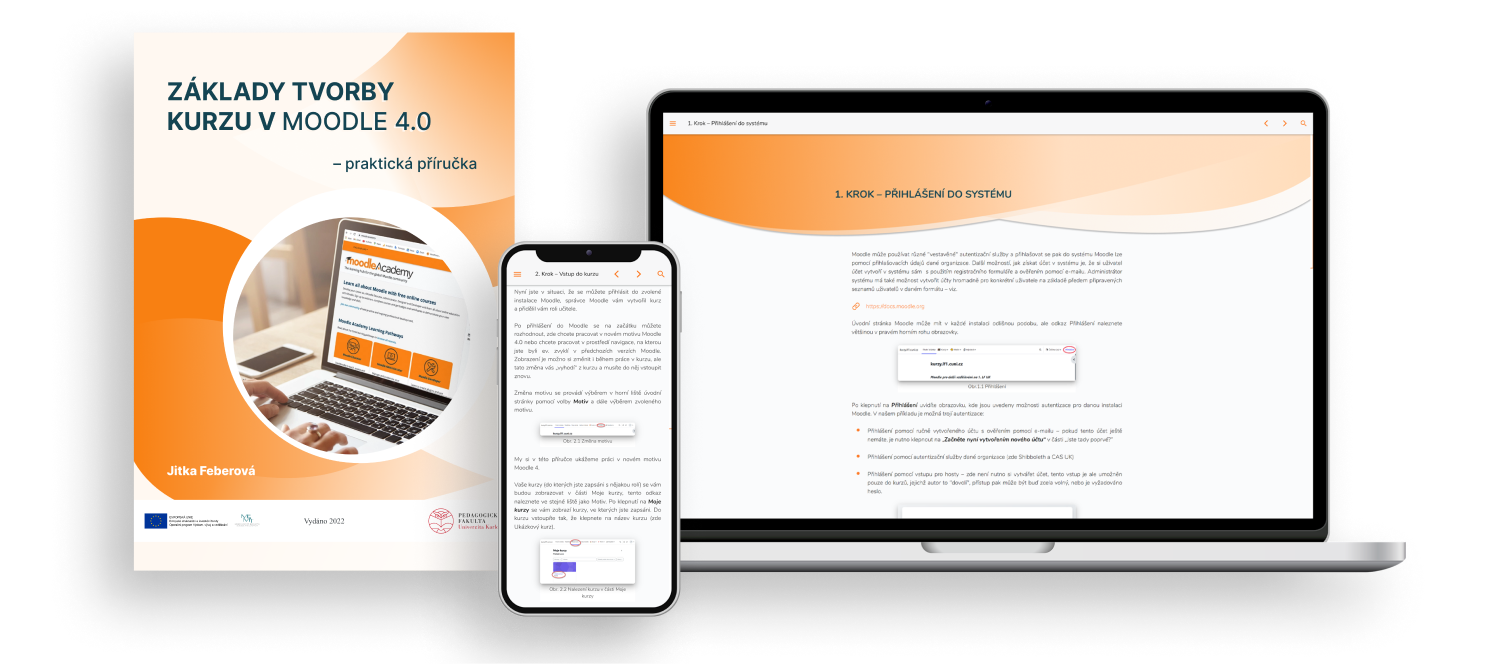
Basic set of open, free and freeware software for personal and school use
MDr. Jitka Feberová, Ph.D.
B.Sc. Jan Závešicky
The publication is intended to serve as an aid for teachers and ordinary users, providing them with an overview of selected freely available software tools that can be used in teaching and learning. In the first part, the reader is briefly introduced to the issue of licensing, supplemented by interesting links dedicated to this issue in depth. In the following sections, along with a few tips, software is presented that the user can use for most office work and possible visualizations for free and without an Internet connection. In the last part, on the other hand, the reader will find tools that are available online for free, without the need to install anything on the computer.
